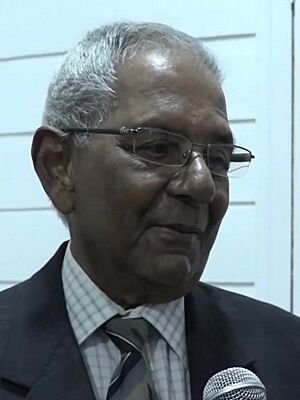Ramsewak Shankar facts for kids
Quick facts for kids
Ramsewak Shankar
|
|
|---|---|
| रामसेवक शंकर | |

Shankar in 2023
|
|
| 4th President of Suriname | |
| In office 25 January 1988 – 24 December 1990 |
|
| Vice President | Henck Arron |
| Preceded by | L.F. Ramdat Misier |
| Succeeded by | Johan Kraag |
| Personal details | |
| Born | 6 November 1937 Nieuw Amsterdam, Suriname |
| Political party | VHP |
Ramsewak Shankar was an important politician from Suriname. He was the 4th President of Suriname from 1988 to 1990. Before becoming president, he worked as the Minister of Agriculture and Fisheries from 1969 to 1971.
Shankar was born on November 6, 1937. He is part of the large South Asian community in Suriname. He studied at Wageningen University in the Netherlands. After his studies, he returned to Suriname. He then became active in the Progressive Reform Party. He also supported Suriname becoming an independent country in 1975.
Becoming President of Suriname
Ramsewak Shankar became president after a special election in November 1987. The country's military leaders had created a new constitution. This new rule allowed the military leader, Dési Bouterse, to stay in charge of the army.
Shankar took over from L.F. Ramdat Misier as president. At first, his government had strong support from the National Assembly.
Working for Peace
In 1989, an important agreement was signed. It was called the Treaty of Kourou. This treaty was a ceasefire between the Jungle Commando and the Surinamese army. The Jungle Commando was a group of Maroon people. They had been fighting to protect their traditional lands in the rain forest.
President Shankar agreed to forgive the Maroons for their actions during the conflict. This was part of an effort to end the fighting. He even talked about letting them keep their weapons in the interior of the country.
In April 1989, a general pardon was passed. This meant that people would not be punished for violence during the conflict. However, it did not cover serious human rights violations. Most of these violations had been done by the National Army.
Dési Bouterse and his National Democratic Party did not like this agreement. They said it went against the country's constitution. But the National Assembly still approved the Kourou Agreement. They voted for it with a large majority.
The "Telephone Coup"
In December 1990, both President Shankar and Dési Bouterse were on an international trip. They stopped at Amsterdam Airport Schiphol in the Netherlands. At the airport, Bouterse was not allowed to leave the security area. But President Shankar could pass through. He was able to talk to many reporters.
When they returned to Suriname on December 21, Bouterse was very angry. He criticized Shankar for not protesting the airport incident. The very next day, Bouterse resigned from the Army.
Just a few days later, on December 24, a military takeover happened. It was called the "telephone coup." This event removed President Shankar from power. Ivan Graanoogst was then made the temporary president.
On December 29, the National Assembly chose Johan Kraag as the new President of Suriname. The next day, Kraag asked Bouterse to return to his position. Bouterse became the Commander of the Army again on January 1, 1991.
See also
 In Spanish: Ramsewak Shankar para niños
In Spanish: Ramsewak Shankar para niños
 | Kyle Baker |
 | Joseph Yoakum |
 | Laura Wheeler Waring |
 | Henry Ossawa Tanner |

